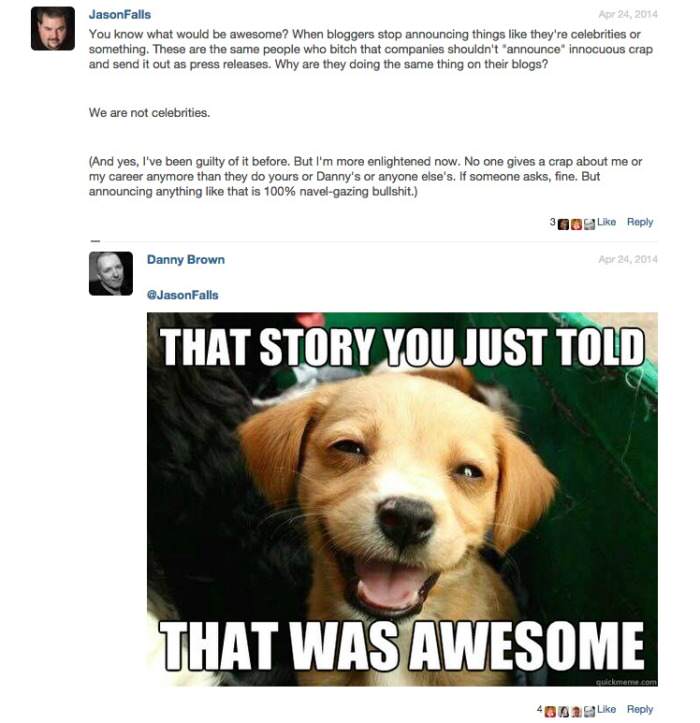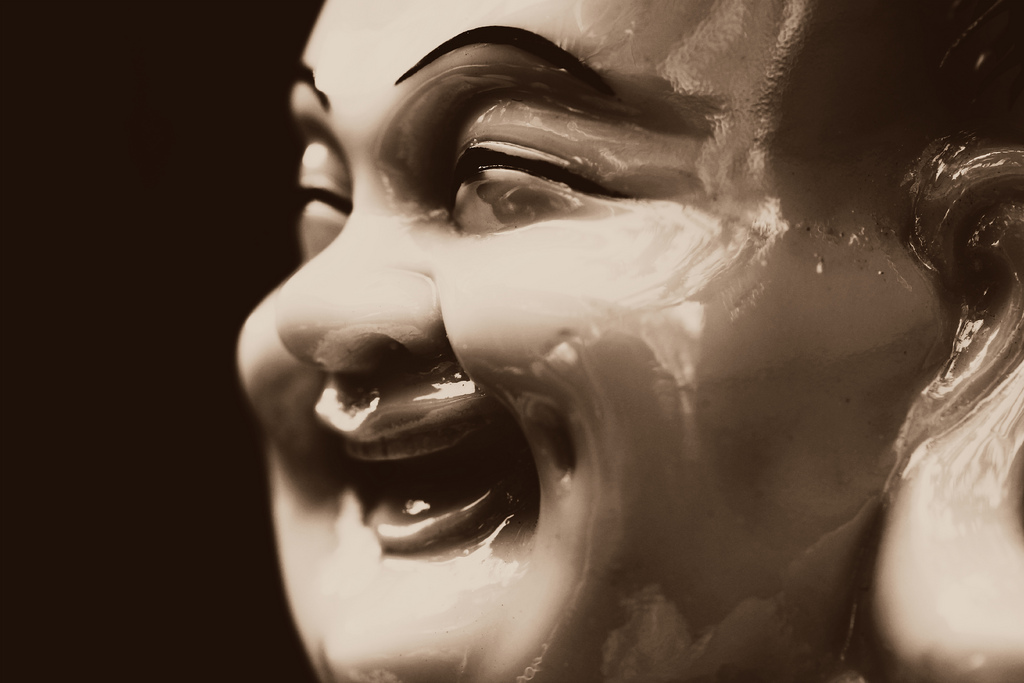Guyside: The Beautiful Freedom of Not Giving a Crap
When I was much younger – say, around 8-9 years old – I used to get in trouble with my school teachers, and other adults in positions of authority, regularly. Pretty much not a day would go by without my mother receiving some troublesome news about me.
I guess, looking back, I simply had an aversion to authority.
And while that continued until my early teens, when I learned what it meant to really show respect and understand conflict with authority was primarily in my mind, I also learned something at that young age that must have made an impression (even subconsciously) from my granddad.
Wisdom Has No Age Limits
I always loved my granddad. He was the safety net I’d cling to when everyone else seemed down on me. He was the one that would let me watch TV just that little bit later. He was the one who would let me read my comic under the bed with the flashlight, when everyone else would confiscate the flashlight.
In short, he was the one that would break the rules and let me be who I wanted to be. Except, not really.
Instead of letting me be an out of control tearaway, looking back he was actually guiding me to be a better person because of the trust I had in him. When he spoke, I’d agree and nod – even if I didn’t like it. And – usually – do as he said.
Whether or not my mother was in cahoots with him in this endeavour, I’ll never know. Perhaps, perhaps not. Either way, he made me stop and think of the things my mother was trying to teach me.
So, when I was having my brush with people in authority, my granddad pulled me aside, and said the following:
You might think grown-ups are bad, and stopping you from having fun. And, sometimes, they will. But it’s only because they love you. Now – you can choose which ones to listen to. And, I know not everyone is worth listening to. So here’s a trick – listen to the people who love you, every time. Your mum. Your sister. Me. Your grandma. Listen to your friends, but only the ones who don’t make you feel bad about yourself. And listen to your teachers who make you smile when you’ve done something. These people are all just trying to help you enjoy life. And that’s something not everyone will do.
Now, I know I’ve paraphrased some of his words. After all, this was almost 40 years ago (holy crap, I’m getting old!!). But the gist of the message is definitely there.
And it’s one I use today in pretty much everything I do, and you should too. Here’s why.
Living Life The Way It’s Meant to Be Lived
In a recent edition of TIME, there was a fantastic memorial article by David Von Drehle, about a gentleman named Charlie White. David and Charlie were neighbours, and David’s piece wrote about the lessons Charlie instilled from a life well lived. Charlie was 109 when he passed last month.
The article recounts passages of time from the turn of last century, and is a fascinating and warm look into a period of time most of us will never have known. Yet it’s also a reminder of how to live a life well lived.
Charlie’s “secret” to a happy life was the realization that you have to separate the things you can’t control from the things you can. This was a lesson he imparted to one of his daughters when she was having issues with someone that was frustrating her. Charlie’s advice?
You can’t change people like that. If I let people irritate me, I would have been dead long ago. Source.
The fact Charlie lived such a long and happy life has to have some part in this mindset. It’s the same mindset my granddad had, and is – essentially – the one I try to live to these days.
After all, let’s face it – how important are the words of others who actually have no real impact over who we are and what we stand for?
Those That Matter and Those That Meh
Back in April of this year, I wrote a post on why readers of this blog might want to unsubscribe. It was a post that shared the direction this blog was moving in, and a heads up that if readers wanted to subscribe to a purely marketing blog, this one wouldn’t be for them (and I recommended five other blogs to subscribe to instead).
I’d just become bored of only writing about marketing, social media, etc., and all that entails. We’re people, all of us – we’re not tied to talking about just business in life, so why should we be on our blogs (or other social footprints)?
After this post, I received a whole bunch of emails (as well as comments on the post itself) from others who felt the same, and were “glad” to see someone say it out loud, encouraging them do the same thing. And that’s the real beauty of blogging and content – even if you help just one person make a choice, that’s all that matters.
Arik Hanson, a PR and communications pro over in Minneapolis, shared his thoughts in a post entitled “Is the age of the independent PR blogger over?”. He looked at how many of the bloggers in his feed had either changed direction, or simply given up altogether to concentrate on, well, life and family and all that important stuff.
In the comments, social media guy Jason Falls left quite the entertaining diatribe (click image to expand).
When I got the update to the comment being left, it made me chuckle – because, really, who gives a crap?
It doesn’t matter what Jason thought (and I like Jason, he seems a decent guy), because it wasn’t for him (hence the dog picture reply). The original post was for the folks who said it helped them make up their minds to produce the content they really wanted to produce.
And that’s why we need to collectively take more of a “who gives a crap?” approach to comments, blog posts, social updates, etc. The people that moan and react usually aren’t the ones that either matter (from an audience point of view), or who have little relevance to you anyway.
If someone on Google+ calls you an idiot for having a point of view, who cares? The real idiocy comes from trying to stifle opinions with rudeness or ignorance. If that person has little effect on your bigger picture, let them stew in their own little miserable bubble.
Same goes for the content you produce. Own it, and be happy to own it.
Enough With the Egg Shells
There was a great post earlier this year from Marc Ensign, called “The Pussification of the Internet”. In it, Marc shares how the web has become this place where we’re too scared to have an opinion, because we’ll be jumped on by others, or called to task, etc.
Because of this, the web is in danger of becoming a sanitized version of what it should be – open, challenging, questioning and, most of all, bare bones honest. It’s a great – if not quite safe for work read – and well worth your time,. Because it’s true.
Last month, the Pew Research Internet Project released its latest report, and it made for some enlightening – and a little bit scary/sad – reading.
Entitled “Social Media and the Spiral of Silence”, it shared the answers of just over 1,800 adults and their thoughts on the impact of the Edward Snowden / NSA fallout in the US and beyond, and how that affected the way these adults conversed online.
There are many interesting takeaways from the report, but two in particular stood out.
- In both personal settings and online settings, people were more willing to share their views if they thought their audience agreed with them. For instance, at work, those who felt their coworkers agreed with their opinion were about three times more likely to say they would join a workplace conversation about the Snowden-NSA situation.
- Previous ‘spiral of silence’ findings as to people’s willingness to speak up in various settings also apply to social media users. Those who use Facebook were more willing to share their views if they thought their followers agreed with them. If a person felt that people in their Facebook network agreed with their opinion about the Snowden-NSA issue, they were about twice as likely to join a discussion on Facebook about this issue.
Now while these two points refer to unease on how the US government is monitoring the conversations of its citizens, it also highlights the growing issue of just going with the flow as opposed to taking a stand.
It’s a walking-on-egg-shells mentality that both limits our growth and inhibits our learning. If we were all meant to have the same point of view, we may as well quit now because there would be no need for us to be.
That’s not to say we ignore everyone else – far from it. But we do need to start standing up for ourselves and our opinions more, and not just be part of the herd.
Like my granddad said himself, think of who you want to listen to. Think of who you want to take advice from. Think of who actually matters, and whose opinion and feelings you wouldn’t want to hurt. And be respectful of those you disagree with.
For everything else – who gives a crap?
This post originally appeared on dannybrown.me.
Read MoreGuyside: The Trick to Social Media Happiness? Spend Less Time By Doing More
I’ve found myself wondering whether social media is all it’s cracked up to be.
Sure it makes it easier to connect with people from all over the world, from Nigeria to Nicaragua and from Pakistan to Poland, but how much satisfaction and contentment are we really getting from this online craze?
Social Media And Value
It’s common these days to see people heavily engaged in social media, chatting to their friends about any topic under the sun. They’re either on Facebook or Google+, or they’re on Twitter telling the world about the strange homeless man they’ve just walked past.
But despite all of this usage that social media gets, is there a lot of value going on around here? Are there any debates as to how to solve the problems of the world, or even a genuine problem that one of their friends is going through? Better yet, how many conversations in social media do you get where at least one person feels genuinely better having had that conversation?
Social Media And Time
Let’s look at another perspective on this, look at the amount of time we spend active on social media sites. The extremists spend up to 7-8 hours a day on social networks, but I believe the average person of today spends between 1-2 hours a day.
Now, let’s say that someone spends 1 hour a weekday on social media, and 2 hours a day on weekends, chatting away with their friends and viewing the latest photos and tweets. It sounds like a ‘normal’ amount, right? Multiply each weekday by 5, and each weekend day by 2, and you’re left with a weekly social media total of 9 hours a week on social media sites.
Again, this may seem like a normal and ordinary amount for you, but let’s now look at what you’re spending those 9 hours on.
Social Media And Content
Let’s look at some of the things you can do on social media:
– Instant messaging
– Updating statuses
– Sending individual/direct messages
– Promoting yours, or someone else’s content
Looking at these items, we can certainly keep in touch with our friends, and we can keep up regular relations with our clients. This is all well and good, but take this away, and what is left? What else can you do in social media besides these afore-mentioned items?
The truth is, not a lot.
Sure, you can play games and you can ‘poke’ your friends and family, but is this really important? Even referring to what is listed above, how much time do you need to be spending there? Do you really need to spend 9 hours a week on keeping in touch with friends and clients?
Granted, some of the more important relationships in your life will warrant a longer time, but the more important relationships in our lives are also maintained outside social media, and even outside the internet. Our families and our closest friends are traditionally the ‘more important relationships’, and how many of them are based primarily on a social media network?
Take away the ‘core relationships’ of your life and you’re left with those relationships that are standard, such as those with our clients and the rest of our social circle. Do you really need, or want, to be spending 9 hours a week building a relationship with them?
That’s a question that only you can answer for yourself, but I believe a good portion of those 9 hours can be spent otherwise.
Social Media And Society
Let’s consider the big picture – social media is meant to represent, at least in theory, the ‘society of the world’. It’s meant to be the voice which communicates to the world what the ‘common person’ is thinking, and what the common person wants. In other words, social media is meant to be our way of communicating with the world at large.
Do you think it’s doing a good job?
Personally, I don’t think it’s doing a good job at all. There’s too much mindless chatter, too much time wasted on activities that are either trivial or completely meaningless. And the worst part is that this isn’t likely to end any time soon.
If social media wishes to truly provide happiness on a deeper scale, then it needs to provide deep and lasting value. Enabling someone to provide a virtual cake for a friend on their birthday is not deep and lasting value. Having a deep conversation with someone about their countries’ politics, and discussing ways to improve is a much better way to provide deep and lasting value.
In fact, discussing deeper issues and opening up on a level that both parties agree upon and trust, is something that can quite easily come about. How? The trick is to be more aware.
Be Aware
Social media is the same as any other feature in this world – you get out of it what you put into it. If I was to spend an hour on Facebook viewing other people’s profiles and checking for new photos, then I’m not going to get much out of it. But if I have a meaningful conversation about a third-world crisis with someone, then I’m going to feel much more engaged and energised as a result.
So here’s the key – be more aware of what you use social media for. That’s my challenge to you. The next time you log onto your Google+ or your Twitter account, decide there and then what you’re going to do with your time. Then, as you’re using that social network, be aware of your actions and what you’re clicking on. If you find yourself drifting off into auto-pilot, bring yourself back to your pre-set agenda. Simple as that.
By being more aware, you can get more value out of your social media time, and possibly spend less time by doing more. There’s a lot of benefit up for grabs here.
So I’ll see you in the chatroom?
image: Paloetic
Read MoreOn Why We Need to Reclaim Realism
In an article from TIME magazine last year, Virginia Postrel writes about The Twisted Allure of Jihadi Glory. While it features the outcry over the Rolling Stone cover featuring Boston bomber Dzokhar Tsarnaev, it poses a bigger picture question on the power of glamourization.
Postrel shares a quote from novelist Salman Rushdie, no stranger to controversy himself as the author of the 1988 novel, The Satanic Verses. Asked about what motivates suicide bombers, Rushdie’s answer is illuminating:
Terror is glamour – not only, but also. [Terrorists] are influenced by the misdirected image of a kind of magic… The suicide bomber’s imagination leads him to believe in a brilliant act of heroism, when in fact he is simply blowing himself up pointlessly and taking other people’s lives.
As Postrel shares in her piece, Rushdie hits the nail on the head when it comes to how glamourizing something offers an incentive to act upon, to increase the perception of who we are and how we act, which made me think of how glamour warps our everyday lives.
The Power of Glamour
You can go back to virtually any point in history, and you’ll find countless examples of glamourizing something that was anything but.
In her piece, Postrel talks about martial glamour – or how war seemed glamourous to those that would follow in their leader’s footsteps. She talks about Achilles from ancient Greece, but you could also look to the poem The Charge of the Light Brigade, by Alfred Tennyson, to see how war was glamourized.
Forward, the Light Brigade!
Was there a man dismay’d?
Not tho’ the soldier knew
Someone had blunder’d:
Theirs not to make reply,
Theirs not to reason why,
Theirs but to do and die:
Into the valley of Death
Rode the six hundred
When can their glory fade?
O the wild charge they made!
All the world wondered.
Honor the charge they made,
Honor the Light Brigade,
Noble six hundred.
Until the First World War and its huge loss of life, war was seen as a heroic endeavour. Today, we think differently – and yet, as Postrel’s piece shows, some of us don’t.
This is the problem with glamourization – how do we reel in what we encourage blithely?
The Persuasion of Hope
Marketers and brand advertisers have been using glamour in a bid to create desire and action within their target audience for years.
Think back to the black and white movies of the 40’s, where the movie stars of yesteryear would happily smoke on-screen and be regarded as sexy and sophisticated for it. Today, we know the dangers of smoking – just over 70 years ago, it was actively encouraged.
Or look at the success of magazines like Vogue and Elle, that portray perfect women that rarely reflect society’s real women and their various shapes, sizes and lifestyles.
These examples, and others like them, build on the desire of their audience(s) to be more like the actors on screen or the models on the page, as opposed to being happy with who they are.
By tapping into this powerful hope, or desire, brands use the power of persuasion that people need to be something they’re not in order to be valued.
As Postrel shares in the TIME article, that value can come from making powerless people feel significant. In advertising and marketing, that value can come from answering the “if only” question.
- If only I had a better job;
- If only my car was as cool as my neighbours;
- If only I could look good in that tiny bikini;
- If only. If only.
The problem is, even those we aspire to be like aren’t perfect. Magazines take perfectly good-looking people and airbrush them to an even higher plane of “perfection”. Movies use focus filters and post-production effects to showcase their stars in the best light.
By creating an unrealistic desire, we’ve created a culture of hope that can never be met – at least, not until the next campaign where we can start it all over again.
Realism and Reclamation
The problem, of course, is that to deny hope, we deny growth and our future selves. Why shouldn’t we want to reach for something we don’t have, or be like someone we admire?
The thing is, we don’t need to deny ourselves. We should do all these things, and more. But we should do it realistically.
We need to stop promoting the idea that unrealistic imagery is the norm. Individually and in a wider context, we need to understand that glamour is only a facade of what realism truly is. To continue to glamourize our perfect selves doesn’t help us grow – it merely stunts us, and that benefits no-one.
It’s not as if we need to play the glamour card, either.
- The Dove Campaign for Real Beauty has won widespread praise for the way it showcases the beauty of women in all their natural sizes;
- UK retail chain Debenhams has invoked a ban on airbrushing models for their promotional materials;
- Lifestyle magazines like Cosmopolitan are calling for clothes manufacturers to stop the obsession with unrealistic sizes.
These are important steps from the types of companies on the front line that can truly initiate a different way of thinking. But they’re just the first steps.
As marketers, we need to be able to instil desire without taking the lazy way out. As businesses, we need to be more realistic on who our target audiences are and what they really feel, and need.
More importantly, as men – in marketing, advertising and plain old life – we need to look at women the same way we do each other. After all, when was the last time you saw a guy photoshopped to the Nth degree to present a false idea of sexiness to women?
Hopes and dreams are one thing. Selling hopes and dreams is another, and it’s the latter that can make the biggest leap to connecting the two together.
It’s time to see who’s up to the challenge.
image: Julian Rodriguez Orihuela
Read MoreGuyside: Do You Want to Be a Better Person, Truly?
When I was younger, I did some horrible things. Some, I didn’t know better because of age.
At least, I’d like to think so. For example, when I was four years old, I threw a tantrum fit while shopping with my pregnant mother. As she told me off, I punched her in the stomach.
Now, I’d like to think a four year old kid doesn’t throw a mean punch, and my mum didn’t flinch or give the impression that I’d hurt her. But every time I think of that moment, I think what an idiot thing to do.
Four months later, my sister was born. Early in her childhood, she developed kidney problems. One of them failed to work properly, so she had to take medication for a good chunk of her early years.
The doctors and my mum assured me it wasn’t the result of my punch during pregnancy – but then, they would say that to a little boy, right? So, I always feel I attributed to my sister’s health issues early on.
Skip forward a few years, to when I was maybe 11 or 12 years old, and I was a parent’s nightmare.
Early Trials
I lied. Often. I blamed my sister. Often. I stole from my mother’s purse, even though we were so poor our daily diet for about five years was nothing but Corn Flakes.
It got so bad that my mum and her boyfriend at the time – soon to be step-dad – sat me down at the kitchen table and threw about £6.50 in loose change – pennies, two pence pieces, ten pence pieces (UK money) – onto a plate in front of me.
He said, “Go on – eat that. That’s all we have left for a week because you keep taking everything else. We can’t buy food, but we don’t want you to starve, so take that.” My mum was in tears, and so was I. Had I really become this person?
Clearly, I had – because less than a week later, I stole from my mum’s purse again. This time, it was my mum who took action, and marched me down to the local police station and had the desk sergeant talk to me.
That worked. It scared the shit out of me, on two levels – first, jail scared me. Just being near the cells made me a quivering wreck. Second, it was my mum who marched me down. The woman who always forgave me, and saw no wrong in me despite the fact there was.
That jolted me more than anything, and made me realize something had to give.
Thankfully, something did give.
The Finding of Respect
One of my school friends told me about the Army Cadets – an institution for kids 13-18 to learn about army life, go on expeditions and (best of all) fire real guns! As a 12 year old needing something to keep him busy, I was sold.
Little did I know just how much the idea of “being in the army” would change my life.
I found people that wanted to help you. I found a sense of belonging. Of loyalty. Of wanting to do right. I found discipline, and honour, and respect for both peers and elders.
Simply put, I found what it’s like to be a real member of society.
It took my life on a completely different path than the one I know I would have been on otherwise. From my time in the cadets, I took away what it means to be a member of the community. Of how to stand up for your friends and protect the vulnerable.
That led to me taking up martial arts, and the discipline of karate. Again, I loved the loyalty and peer respect that discipline brings. I studied up until my brown belt, which is one below the black belt, before life events took precedent and I had to stop training for the next belt.
What karate taught me is that everyone is equal; the concept of “I’m more skilled than you” doesn’t exist, because there is always the moment someone less experienced can take you by surprise.
Karate also taught me to be a more patient and receptive person, and accept that situations are never truly in your control – it’s how you react that makes the difference.
It also showed me – finally – why we need to continuously strive to be a better person.
The Family is Everything
I truly believe that had I not made the decisions at that turning point when my mum took me down to the police station, I wouldn’t be where I am today.
I wouldn’t be the kind of husband I want to be for my wife Jacki; nor the father I want to be for my kids Ewan and Salem; nor the kind of friend I want to be for those that are kind enough to take me on as a friend.
For me, true friends are family and I want to be able to act if I need to to protect them, and help them when they need help.
I don’t always get it right. I still make some crap decisions, and I know it hurts people. But that’s the thing with trying to be better than you are – you do make mistakes and you will continue to do so. The hope is, you learn from them.
Being a good person is not a given – you can say all the stuff in the world about how good you are, and how you’ll look out for those around you.
But if your actions don’t back up your words, you’ll never be anything other than the person that said so much and delivered little.
We don’t have to be that person. We shouldn’t be that person. Whether we are or not, though, comes down to one simple question:
Do you want to be a better person, truly?
The rest is up to you.
image: Leon Rice-Whetton
Read More










